Jean-Claude Duvalier: Brutal Haitian dictator who ruled the country for 15 years
He governed Haiti longer than his father thanks to the untiring but rather shamefaced support of Western governments, notably the US, and of the UN financial institutions such as the International Monetary Fund
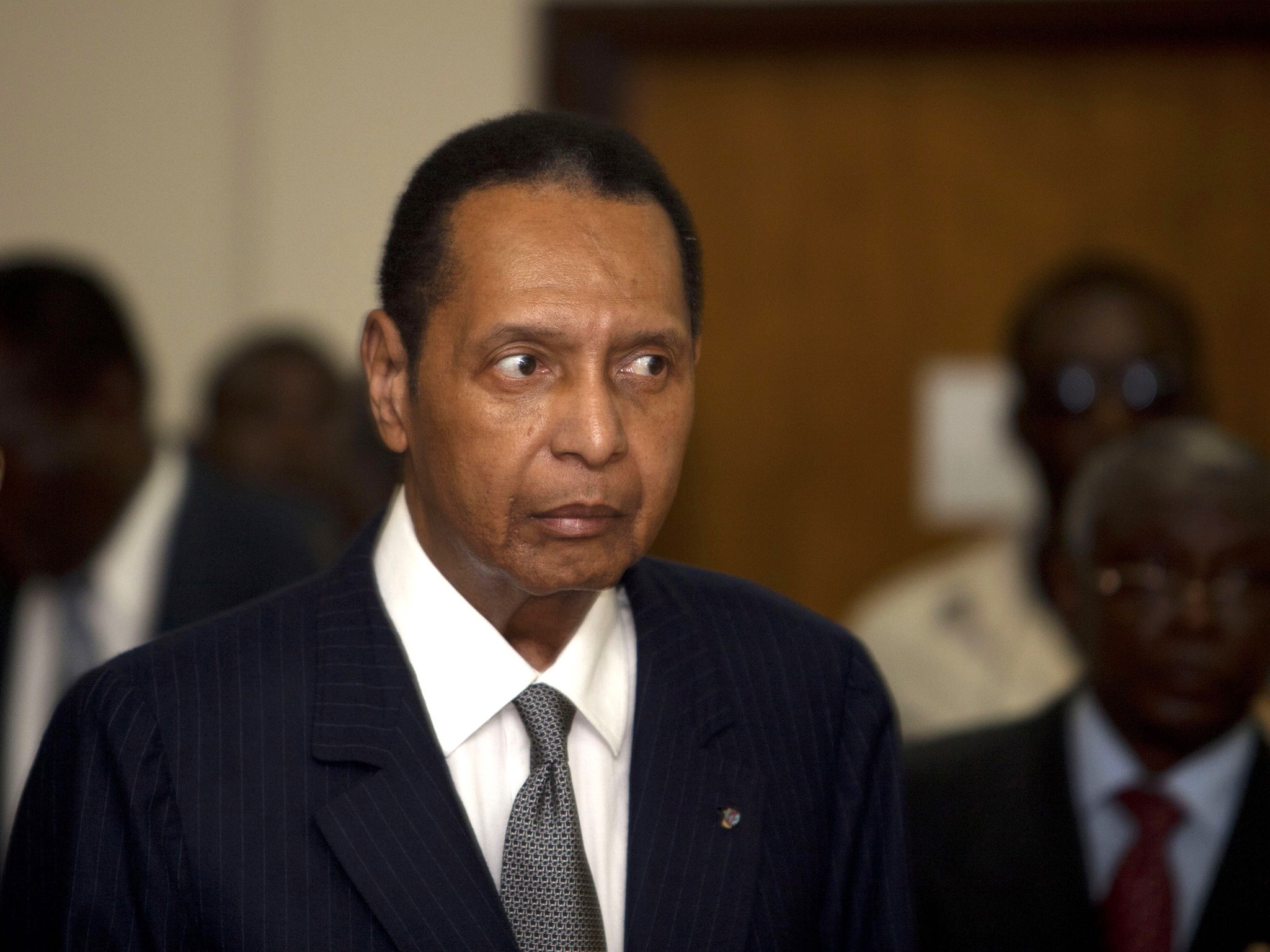
Your support helps us to tell the story
From reproductive rights to climate change to Big Tech, The Independent is on the ground when the story is developing. Whether it's investigating the financials of Elon Musk's pro-Trump PAC or producing our latest documentary, 'The A Word', which shines a light on the American women fighting for reproductive rights, we know how important it is to parse out the facts from the messaging.
At such a critical moment in US history, we need reporters on the ground. Your donation allows us to keep sending journalists to speak to both sides of the story.
The Independent is trusted by Americans across the entire political spectrum. And unlike many other quality news outlets, we choose not to lock Americans out of our reporting and analysis with paywalls. We believe quality journalism should be available to everyone, paid for by those who can afford it.
Your support makes all the difference.On the death of his father, François “Papa Doc” Duvalier, when he was still only 19, Jean-Claude Duvalier, “Baby Doc”, succeeded him as Haiti’s President for Life.
He ruled from 22 April 1971 until 7 February 1986, when he was forced to flee. He governed Haiti longer than his father thanks to the untiring but rather shamefaced support of Western governments, notably the US, and of the UN financial institutions such as the International Monetary Fund and the World Bank.
Especially during the term of President Reagan, Baby Doc was presented as a firm anti-Communist and a bulwark against Castroism. That view, however bizarre, ensured him military and diplomatic backing. He was also given all the money he and his wife Michèle needed to maintain a prodigal style of life in one of the world’s poorest countries, and later in exile.
Born in Haiti’s capital city, Port-au-Prince, in 1951, the only son and youngest of the four children of Papa Doc and his formidable wife Simone, a former nurse, he was the apple of his father’s eye and led a pampered existence. When he was six his workaholic father began a presidency which lasted for more than 13 years, bringing him supreme power which he exercised with consummate brutality.
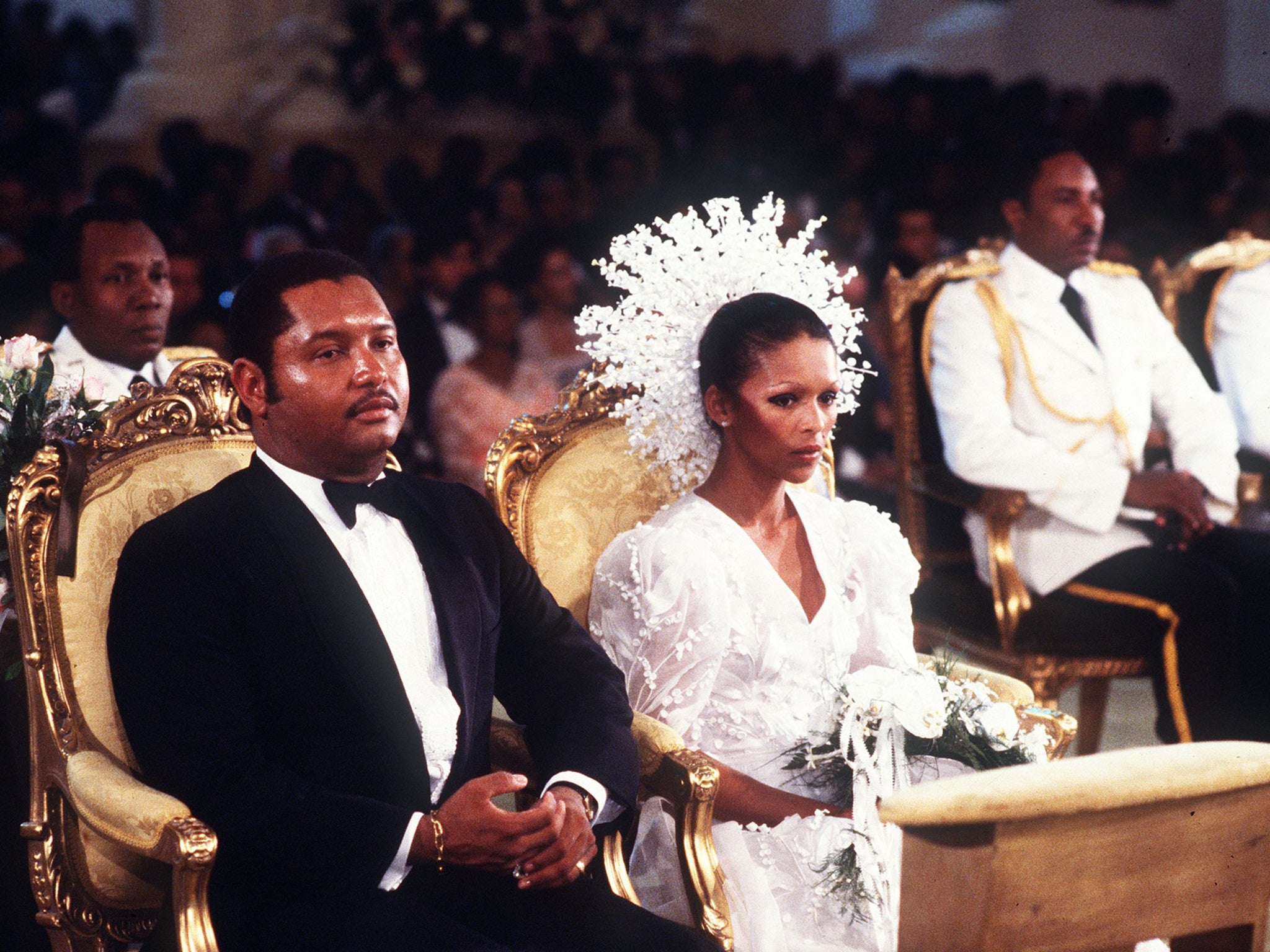
Jean-Claude was sent to the Methodist Collège Bird in Port-au-Prince, where he first met his future wife Michèle, the daughter of a wealthy businessman, Ernest Bennett, who exported coffee and cocoa and imported BMW cars. The calm of his childhood was momentarily punctured on 26 April 1963 when the car delivering him and his 14 year-old-sister Simone to school came under a fierce attack which killed the driver and two bodyguards. Jean-Claude’s father wreaked vengeful murder on those with any connection with the assassins. The boy was transferred to the Lycèe St Louis de Gonzague, a Christian Brothers establishment where he was lethargically happy.
The family, however, was not happy. On one occasion in 1967, after the elder Duvalier had flailed at his mother, the 15-year-old pushed his father into a room and kept him locked up there for three hours. On 18 November 1970 the old man, feeble and failing fast, formally named the teenager his successor.
The obese, knock-kneed and ponderous son who regularly went to sleep over schoolbooks – indeed any book – was initially appalled at the prospect, guessing rightly that it would be a distraction from his passions for fast cars, fast motor bikes, fast girls and loud music. He wanted his sister, Marie-Denise, to take the job, but the day after Papa Doc’s death he became the world’s youngest head of state as a requiem mass was said by Archbishop François-Wolff Ligondé to the strains of Beethoven’s Ninth and a salute of 101 cannons. The US ambassador wore lapel pins of both Duvaliers. Tranquillised by valium, Jean-Claude did not attend.

For years he left the administration of the country in the hands of his mother, the grasping Simone, and her long-time lover, Luckner Cambronne, chief of the traditionalist group known as the Dinosaurs. As in Papa Doc’s time, the emasculated army yielded precedence to the Volunteers of National Security, the Tontons Macoutes. From the presidential court Cambronne ran a prosperous business exporting five tons of blood plasma a month. Under Duvalier’s indulgent eye he bought it for $5 a pint and sold it on at $35 to US firms such as Dow Chemical. He also traded in cadavers.
Nevertheless the President for Life became the people’s darling, informal, friendly, always ready for a game of dominoes with his subjects. Washington, too, was charmed and, encouraged by a pro-Duvalier coterie around the US Congress, increased its subsidy to him from $9.3m in 1974 to $35.5m in 1975.
Away from the limelight the regime tortured and starved its enemies to death, notably in the capital’s Fort Dimanche. Duvalier told jailers to turn one prisoner into garbage: “Make him a vegetable,” he ordered.
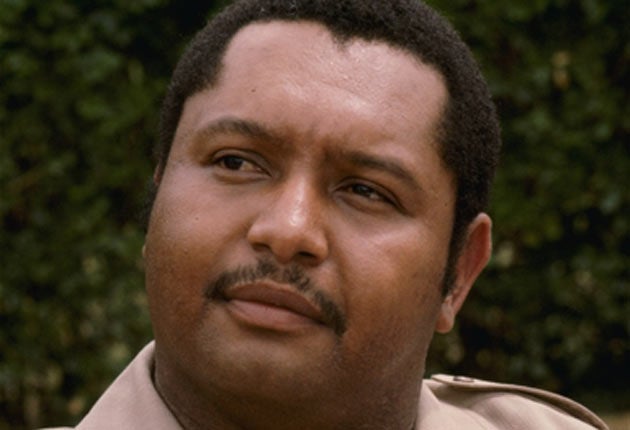
On 27 May 1980 Jean-Claude married Michèle in the Catholic cathedral amid celebrations which cost $7m. Her marriage to Alex Pasquet, by whom she had had two children, was conveniently declared null by the Vatican at the instance of the pliable Ligondé, who performed the presidential nuptials.
Duvalier’s marriage brought about terrible family discord, particularly with his mother, a power behind his father’s throne who enjoyed the title of First Lady. She was cast aside and stripped of the title, which was given to Michèle, who forced Jean-Claude on to a slimming diet, threatening staff who dared provide him with food that “they will wish they’d never been born,” according to Elizabeth Abbott, an historian of the dynasty.
In 1980 the country suffered a foreign exchange crisis which was overcome with a $22m loan from the IMF – which did not prevent $4m going to the Tontons Macoutes and $16m to the president’s personal accounts. President Carter created some problems but these were forgotten in November 1980 when Duvalier threw a champagne party as Ronald Reagan defeated Carter at the polls.
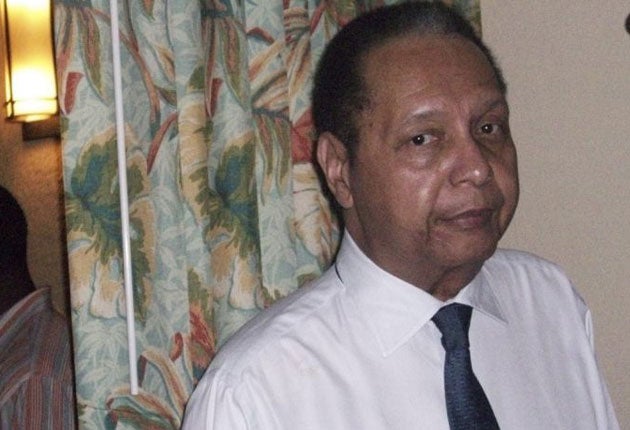
As the country sank deeper into indigence Duvalier allowed his court ever greater latitude for swindling. In 1982, for instance, his father-in-law appropriated $11m worth of crude oil supplied cheaply as aid from Mexico and sold it to the apartheid regime in South Africa.
The dictator’s fall was presaged by the visit in 1983 of Pope John Paul II. He called for change, encouraging the vacillating clergy. The following month 860 of them signed a petition calling for the Church to concentrate on the needs of the poor majority. Seven bishops were invited to Rome, where the Pope urged them to continue. Despite bloody repression his adversaries continued to undermine the president of a state where, as the historian James Ferguson remarked, for every teacher there were 189 members of the security forces. In a largely illiterate country the Church’s Radio Soleil was particularly effective. Tardily the US government, too, came round to a hostile posture.
After much indecision on the night of 5 February 1986 the President for Life decided to leave and ordered Ernest Simon, one of the palace’s houngans, or voodoo sorcerers, to lay a spell on the presidential bed so that the next occupant would die a terrible death there. The houngan called for two newborn, unbaptised children whom he could sacrifice in the ritual. The hospital charged $400 though one, a little girl, was sent back: the gods, the outraged houngan insisted, needed male blood. In the presence of Duvalier and his wife the babies were killed after hours of incantations and the liberal use of rum and herbs.
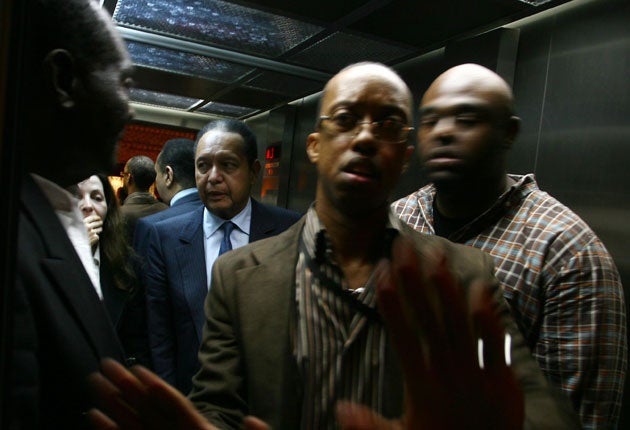
Two days later the US government sent a transport aircraft from its base at Guantanamo Bay which was loaded up with their cash, jewellery, silver, paintings, antiques, furs, shoes, pictures and antiques. It took off in the middle of the night for France. There they stayed at the Hotel de l’Abbaye at Talloires on Lake Annecy until the owner went to law to dislodge them.
They rented a villa near Cannes from the Saudi arms dealer Adnan Khashoggi, where they continued their life of luxury, calling in food from a nearby three-star restaurant. Money came from a bewildering number of accounts in many cities, including Barclays in London and Amro in Geneva.
But exile irked him and he took up with a succession of mistresses procured by his wife’s brothers. Michèle, famously foul-mouthed and never a devoted mother, lapsed into fretful boredom. The couple divorced by proxy in the Dominican Republic in 1989. Michèle won custody of their children Nicolas and Anya and a monthly settlement of $7,500.
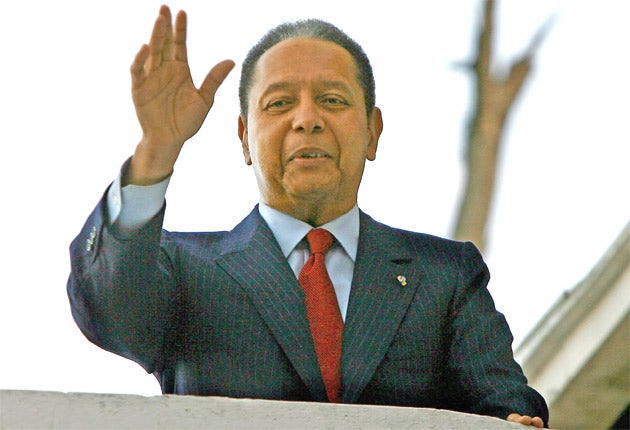
In 2002 Duvalier said it was his “firm intention” to return to Haiti “as soon as conditions allow”, a view he repeated during the removal of Jean-Bertrand Aristide. He was said in 2003 to be short of money and living with his mistress Vèronique Roy in a one-bedroom flat in Paris, but in 2011 he returned with Roy to a country ravaged by the recent earthquake, insisting that he wanted to help the country get back on its feet. Some suspected he wanted to get round new Swiss banking regulations designed to stop former dictators accessing ill-gotten funds.
He was arrested and charged with embezzlement and other crimes, and there was talk of his being charged with crimes against humanity, but he remained in a hotel in the mountains above Port-au-Prince, where he died of a heart attack.
Jean-Claude Duvalier, politician: born Port-au-Prince 3 July 1951; married Michèle Bennett (divorced 1990; one daughter, one son); died Port-au-Prince 4 October 2014.
Join our commenting forum
Join thought-provoking conversations, follow other Independent readers and see their replies
Comments